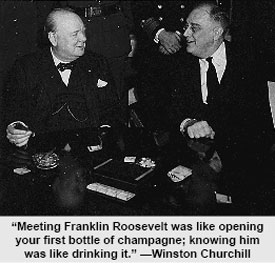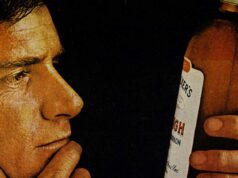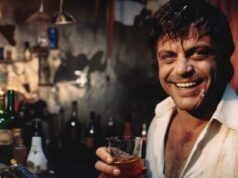The opening flashback in the made-for-HBO film, Warm Springs, sublimely captures what possibly was Franklin Delano Roosevelt’s primary motive for pursuing a political career.
On a bright afternoon, the gubernatorial candidate pours himself and his campaign manager, Louis Howe, each a belt of brown inside his Manhattan den. Howe asks Roosevelt, at the time working as Assistant Secretary to the U.S. Navy, why he’s so set on running on the Democratic ticket. Roosevelt replies, “The Democratic Party is the party of the people. I’m a man of the people.”
“You’re a Roosevelt,” Howe contemptuously returns. “What do you know about people?”
The privileged young man keeps his trap shut and lifts his beveled rocks glass to his lips. He gives no answer, only a smile, as he takes his first sip.
There are the obvious reasons why contemporary historians would argue FDR as the greatest president in the history of the United States: he put the kibosh on the Great Depression with his New Deal program. His “arsenal of democracy” prevailed over Nazi Germany. He restructured the federal government to where it protected the little guy instead of Big Business. Yet Roosevelt had accomplished an even greater feat. He made the most sensible, heroic, and utterly compassionate executive decision ever by anyone who resided at 1600 Pennsylvania Avenue.
He repealed Prohibition.
It wasn’t easy for the New York native. The goody-goody Temperance Movement of the 1910s had gained far too much momentum in Congress, and the 18th Amendment had passed with ease through both houses over the 1917 holidays. Despite Woodrow Wilson’s veto attempt, the bill was ratified two years later. The Volstead Act shortly followed, enabling police enforcement of this unprecedented travesty. This resulted in many cases of police abuse and civil rights violations during any number of speakeasy raids.
The religious right had an unprecedented stronghold in the political arena, piously implicating the drink for inner-city crime, home-wrecking, the abuse of women, you name it. No commander-in-chief would dare stand up against this conservative platform supported by the Anti-Saloon League and William Jennings Bryan’s Jesus-freaked politicos, two constituencies vital for anyone’s stay in federal politics. This dastardly Temperance dominated Capitol Hill for far too long, more than 15 years.
Wilson may have pussy-footed around the Prohibition issue to appease voters, but some presidents were just flat-out too wrapped up in their own party — and I don’t mean partisanship. Think of Wilson’s successor, Warren G. Harding, as Simpsons’ tyrant Montgomery Burns, but with a fully-stocked sidebar. An advocate for big business who had voted for Prohibition when in the Senate, Harding lined his own pockets — and liver — without giving a damn for the public’s empty liquor cabinets.
When he was elected to the Oval Office in 1920, he swilled behind closed doors as if he’d never heard the word “hypocrisy” before. Meanwhile, the rest of the country was going out of its way to sneak a measly flask of hooch home to the family.
Herbert Hoover toyed with the notion of Repeal, but what with the 1929 Stock Market Crash, the highly criticized Republican couldn’t get to it. Annual alcohol consumption had taken a nosedive to less than a gallon per person. People were starving in the streets and dying of thirst, avoiding the local speakeasies for fear of police brutality. By this point, a real political hero was needed to put bread and booze in the mouths of 13 million unemployed Americans.
Enter Franklin D. Roosevelt. He didn’t exactly step into office in 1933 with an empty plate. Fascism was on the rise in Europe, economic catastrophes had browbeaten the nation for five years, but the new president made it a top priority to see that, first and foremost, the Everyman could get his hands on the liquid happiness — legally.

Five days after his inauguration, the former New York governor had Congress convene in a special session to re-legalize beer. By now a good number of political outfits were pushing for Prohibition’s repeal exclusively for its boost to the economy and tax revenues. The academic community, “wet intellectuals” as they were popularly known, believed that hooch would benefit medical studies. (Dr. Samuel Harden Church, President of the Carnegie Institute of Technology in Pittsburgh, praised liquor as “one of the greatest blessings that God has given to men out of the teeming bosom of Mother Earth.”)
Neither faction, though, took the working-class American to heart. It was Roosevelt who had his parched fellow man in his best interest. Repeal was the essential pillar to his 1932 presidential campaign, and when the 51-year old moved into The White House, he kept his word. With FDR leading the way, Congress amicably passed the 21st Amendment. On December 5, 1933, at 6:55 p.m., when Roosevelt’s signature ratified the Twenty-First Amendment, he said, “I believe this would be a good time for a beer.”
And freedom reigned. “The country is deluged,” one scholar accounted. “Barrel-houses have consequently sprung up all over the state. Millions of jugs are in daily use, women ordering for the home. Cars drive up and put their filled jug in the rumble-seat. Long distance beer trucks cross and re-cross the country with huge trailers, running from a Pueblo, Colorado brewery to points between Dallas, Texas, and South Dakota.”
In Chicago, nightlife had “a host of new evils,” according to the Juvenile Protective Association, including the exploitation of women. No, not Jell-O wrestling contests but “girl hostesses” who rubbed elbows with the patrons and enabled them to empty their pocketbooks. The JPA claimed that “parents are having to prosecute proprietors of school-supply and lunch rooms for selling liquor to their children.” Clearly Chi-Town’s party was off the chain.
Speaking of freed shackles, on the first anniversary of Repeal, Schenley Distillers Corporation held a publicity stunt at their Delaware plant where a lager-goggled fellow shattered the links from four million beer kegs. A few years later The New York Times reported that “brewers have even gone so far as to introduce into the House of Representatives a bill to legalize curb-selling of beer to motorists on the streets of the nation’s capital.” It was as if the president had unlocked the gates to paradise.
As much as we’d like to believe that FDR was an utterly selfless, a man who unleashed the keggers that, to this day, pervade on campus, in the taverns, and in our homes, public outcry wasn’t the sole reason for his push for the 21st Amendment. Roosevelt enjoyed the drink on a very personal level.

“Before dinner we usually had martini cocktails made by the President’s own hands,” recalled cabinet member, Robert H. Jackson, in the 2003 biography That Man: An Insider’s Portrait of Franklin D. Roosevelt, “but any impression that the President was given to any considerable amount of drinking … is a mistake. I never knew him to take more than a couple of cocktails, nor did he want anyone about him who drank to excess. He aimed for two cocktails before dinner and then perhaps a smidgen afterward.”
 Jackson is, of course, applying a bit of whitewash. Other legacy-conscious Roosevelt insiders have claimed that FDR’s poker games cut off shortly after 10 p.m., and that the president was satisfied with only two or three cocktails. A rather famous one-liner of his circulates among Roosevelt biographers. In response to his wife’s paranoia about “drinking and fast driving,” he once told his teenagers that “a gentleman learns his capacity and tries not to exceed it. If he must drink to excess, he does so when he has no call to be in touch with anyone else.”
Jackson is, of course, applying a bit of whitewash. Other legacy-conscious Roosevelt insiders have claimed that FDR’s poker games cut off shortly after 10 p.m., and that the president was satisfied with only two or three cocktails. A rather famous one-liner of his circulates among Roosevelt biographers. In response to his wife’s paranoia about “drinking and fast driving,” he once told his teenagers that “a gentleman learns his capacity and tries not to exceed it. If he must drink to excess, he does so when he has no call to be in touch with anyone else.”
Being President, however, meant not owning many moments when he had “no call to be in touch with anyone else,” so one cannot blame him for often exempting himself from the rule.
His family would vacation at their summer home on Campobello Island, where Roosevelt would frequently go boating and fishing (read: getting blasted away from the camera’s critical eye). At the risk of being distasteful, I must say that, although FDR was hobbled by polio, his disease wasn’t the sole reason he used his wheelchair.
During WWII, when the presidential work week was up, FDR would retreat to his Hyde Park mansion in New York and invite Hollywood luminaries, as well as other lefty weekend warriors. You couldn’t talk about the war or politics at the party; you just had to endure FDR’s eccentric bartending skills.
His “Haitian libation” consisted of dark rum, brown sugar, orange juice, and an egg white, shaken in a frosted tumbler — a concoction he developed “for women companions,” according to his son Elliott, “when he wanted them to feel frivolous.” A variety of recipes for his Plymouth brand martinis have been documented, all in a rather disapproving context. Some fellow drinkers didn’t like the combined garnish of olives and lemon peels, others would dismiss his choice of fruit juices, but the most common criticism? Toomuch vermouth.
His kinfolk would pressure him into using different gin-vermouth ratios: his son, Jimmy suggested a 3-to-1; Elliot pushed for 4-to-1; Johnny advocated a stout 6-to-1.
“They were not that strong,” FDR’s grandson, Curtis, told The History Channel earlier this year. “He’d throw in a little gin at the end … He’d also put in two or three drops of absinthe, changing the taste of a martini to where many people — and this is recorded — say ‘The president made the worst martinis I’ve ever tasted.’”
Roosevelt must have liked them fine, however. The president was oftentimes carried off to his White House bedroom by Secret Service men while he chanted college fight songs. Roosevelt got loaded enough in office that he has earned a place among the martini culture’s greatest fictitious and historical luminaries, alongside plastered playboys Frank Sinatra, James Bond, and Nick Charles.

Getting elected to office four consecutive times is one thing, but Roosevelt’s ability to balance his hedonistic and domestic lifestyles will keep heads scratching for centuries. He smoked a pack of cigarettes a day, right up until his disease took a turn for the worse. He philandered, notably with his wife’s assistant, Lucy Mercer. Getting plowed was also a regular pastime. (His children remember, during one particular Hyde Park get-together, dear old dad having a snootful and stumbling over their feet and crashing onto the hardwood floor.) The fact that Roosevelt kept all this in check while sustaining a filial bond with Eleanor, well, that alone shows the degree of this diplomat’s charisma.
When Eleanor was a child, her two uncles were such sloshes that the family couldn’t risk having company over to the house. This stuck to the better half’s bones badly enough that she never touched the stuff. In the 1920s, when her feminist activism blossomed, she preached about drinking responsibilities concerning young girls — not exactly the type of discourse that FDR would indulge in during what he called his “favorite hour of the day,” but at least her public service kept the future first lady out of the house long enough for a couple stiff ones.
FDR liked to say that a nip here and there helped his back pain, but that didn’t stop Mama Roosevelt from ragging on her son’s drinking. A puritan like Eleanor, Sara once snatched the President’s beaker out of his hand, teasingly wet her whistle with it, and asked, “Now, Franklin, haven’t you had enough of your cocktails?” He conducted all his future sloshing sessions in the study, where women were not welcome.
What Sara and Eleanor did not realize was the way in which the bottle assisted the president on the job, specifically in foreign policy. In 1938, when King George and Queen Elizabeth paid a visit to the States, FDR had a cocktail shaker chilled and waiting in the library. The distinguished gent clinked glasses with the old King and enjoyed a thoughtful drink. Three years before the U.S. entered the war, and the cunning Roosevelt was already brewing friendship with the English.
When British Prime Minister Winston Churchill visited the White House for two to three weeks at a time during World War II, the English Bulldog would pull all-nighters accompanied by snifters of brandy and hefty cigars. The president ruggedly engaged in the Brit’s benders, or what the White House staffers called keeping “Winston Hours.” It was noted that, afterward, FDR slept for 10 hours a night, three days in a row to recuperate.
 His preference for chilled rocket fuel was well-known, but FDR bathed in more than just the martini. He was also known to indulge in Old-Fashioneds mixed by his son, Elliot, and occasional glasses of wine.
His preference for chilled rocket fuel was well-known, but FDR bathed in more than just the martini. He was also known to indulge in Old-Fashioneds mixed by his son, Elliot, and occasional glasses of wine.
He practically double-fisted vodkas and Russian champagne overseas with Joseph Stalin and Churchill. (Elliot in later years remembered his father telling him about the “three hundred and sixty-five toasts, one for every day in the year” during the famous Tehran Conference.) FDR even remarked to the Soviet leader that he wanted to market in America the particular varieties of bubbly they were knocking back. And there is, of course, the legendary episode in which Roosevelt turned the dour Soviet leader on to that great gift of democracy, the martini. Stalin politely finished his and said, “Well, all right, but it is cold on the stomach.” This amounted to the only weakness that Stalin would show during the conference. Latter-day Soviet Premier Nikita Khrushchev would elaborate, declaring the martini “America’s lethal weapon.”
It’s plain to see that Roosevelt’s boozing played an intrinsic part ininternational diplomacy and, ultimately, in liberating the Western World from totalitarianism. No wonder there’s a joint called The Roosevelt Bar in Munich.

Happy hour wasn’t exclusive to the Big Three. FDR’s Secretary of State, George Marshall, had an awfully reliable remedy for wartime anxiety. “I spend all my days trying to sort out disputes between the Air Force, the Army, and the Navy, between the British, the French, and the Americans,” said Marshall. “It’s only at the end of the day when I go home and fix my first highball that I remember I’m fighting the Germans and the Japanese.”
FDR’s love for the bottle proliferated throughout his entire administration. After Repeal went into full force, Secretary of the Interior Harold Ickes invested in rum distilleries on the Virgin Islands. The Secretary of Agriculture helped fund a Florida distillery for brandies made from oranges and grapefruit. The Distillers and Brewers Corporation, headed up by former bootleggers, was in cahoots with FDR’s son-in-law, Curtis Dall. Sonny boy Elliot kept the Roosevelt tradition going when, in the 1960s, he fought a Congressional bill which would have banned liquor advertisements from the airwaves.
FDR’s move toward a drunker America instilled a swaggering patriotism and slurring harmony between the underworld and the business community. Organized crime moved on to more legit rackets, mainly gambling. Alcohol sales generated billions of state and federal tax dollars almost immediately after the 21st Amendment passed, undeniably a large contribution to what became the U.S. economy’s fastest growth rates in history. The Repeal critics didn’t stand a chance.
Dry economists argued that the schleppers’ weekly paychecks were spent on beer and whiskey instead of tangible items more beneficial to the job market, e.g. shoes and apparel. Purchases like these would have, theoretically, created more jobs in factories and retail, but are not bartending and wheat-mashing respectable lines of work as well?
This same crowd of prudes claimed that the reintroduction of booze oversaturated the refreshment market. True, soda pop sales plummeted for months after Repeal, but no egghead’s spreadsheet can supersede the fact that, during hard times, nothing enhances the fare at a soup kitchen better than a frosty pint of beer. FDR knew that, and, thus, he restored faith in America among the dry and the impoverished.
FDR died from a brain hemorrhage on April 12, 1945. At the funeral site the following year, drinking buddy Churchill said that “meeting Roosevelt was like uncorking your first bottle of champagne.”
Unfortunately, when the lights went out for the 32nd president, the party at the White House was over. The country didn’t exactly go dry; it just went straight, and the subsequent commanders-in-chief weren’t cocktail kings. Not like FDR, anyway.
Harry Truman was a bourbon man, but kept his drinking well out of sight. Dwight Eisenhower, known more for juvenile pranks pulled in military school than — gasp! — downing some firewater, disbanded the hipster urban drinking scene by inoculating the country into a suburbanized culture replete with cookies, milk, and Donna Reed. Richard Nixon loved his 7-to-1 dry martinis, but no one wanted to drink with him.
It took more than 15 years for another party animal to move into the White House. Since honorary Rat Packer JFK, we’ve had perhaps one other president (Slick Willy) who truly appreciated the going-down-smoothness of top-shelf hooch.
But as far as the 20th Century goes, FDR is the tops, for without his legislative tact in 1933, our lips wouldn’t even know the taste of a $2 well.
—Brian Abrams










